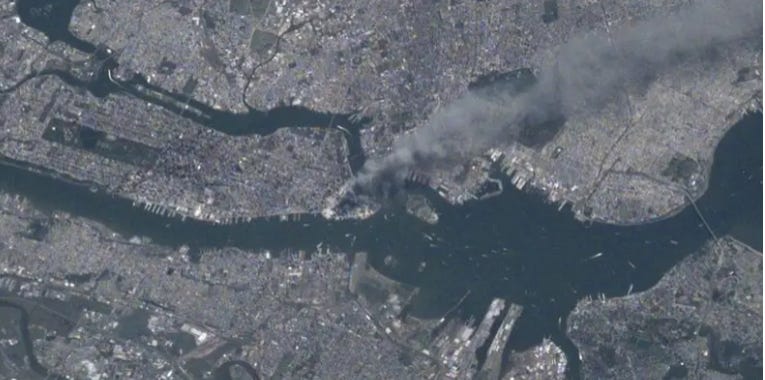A lot has happened in 19 years. Of course, that’s a loaded sentence, as you can pick any point in time and say the same. But we are here, now; not there, then. And our world has been shaped by what happened on that pristine Tuesday morning.
If you’re of a certain age (and I cannot believe I have to write that, mainly as it’s just proof that time marches on whether we like it or not) you most likely remember that day pretty clearly. And if you were in New York City or the surrounding area, you remember the smoke and the smell and the silence.
Ten years ago, I wrote about how my generation’s “where were you” moment, our story, starts with 9/11 and that each generation’s moment is marked in some way by violence: my parents’ generation with assassinations; my grandparents’ generation defined by war. My kids’ generation, however, will be defined by a pandemic.
I once had an editor who didn’t understand why people would go to Twitter or Facebook to share their stories, or pass around articles from that day, calling it ‘disaster porn.’ I look at it differently: we are storytellers, and as the biggest story of our lifetime, we mark the day with hopefully thoughtful remembrance. At a base level, it’s empathy. We come together to share, to make ourselves feel a bit better even if that means making us feel sad at the same time.
Indeed, there’s a theory in communications studies called Narrative Paradigm, which essentially says that since we’re storytellers,
peoples past experiences influence our need for communication and also base our behaviour. Thus narrative paradigm is very helpful in analysing the nature of human communication.

(Image via Sternberg family; taken in 1983)
But telling stories also helps us make sense of the world. It is, in a sense, the very justification of journalism.
And each year, as I read the same stories over and over again—GQ’s The Falling Man; BuzzFeed’s The Worst Day Of My Life Is Now New York's Hottest Tourist Attraction; NYT’s Which Way Did He Run?; Washington Post’s F-16 pilot was ready to give her life on Sept. 11—I’m reminded about the power of narrative, and how journalists give a voice for those that can’t.
There’s one other piece of written material I read each 9/11, and it’s the letter from Commander Frank Culbertson, the only American not on the planet that day.
It's horrible to see smoke pouring from wounds in your own country from such a fantastic vantage point. The dichotomy of being on a spacecraft dedicated to improving life on the earth and watching life being destroyed by such willful, terrible acts is jolting to the psyche, no matter who you are. And the knowledge that everything will be different than when we launched by the time we land is a little disconcerting. I have confidence in our country and in our leadership that we will do everything possible to better defend her and our families, and to bring justice for what has been done. I have confidence that the good people at NASA will do everything necessary to continue our mission safely and return us safely at the right time. And I miss all of you very much. I can't be there with you in person, and we have a long way to go to complete our mission, but be certain that my heart is with you, and know you are in my prayers.

(Image via NASA)
Nineteen years from now, when we look back on this particular story, what will we remember? Of course, the challenge is that we have multiple life-altering stories criss-crossing at the same time, which can confuse, if not anger, us. At the very least, we will have lots of reporting and stories to help fill gaps.
Apologies on taking a different tack with today’s newsletter. Back to media business wonkery next week. And thank you for allowing me in your inbox each day. As always, if you have tips or thoughts on the newsletter, drop me a line. Have a lovely weekend, and be safe, be smart, be kind to each other.
Bruce Springsteen, “The Rising”
Some interesting links:
For platforms:
Despite a Constant State of Crisis, Media Buyers Still Show Interest in TikTok (Adweek)
For sports media:
NFL kickoff game reaps ‘double digit’ ad gain (MediaPost)
How we got here (Defector)
One of the world's top gamers just chose Amazon over Google or Facebook (CNN)
For marketers:
QR codes are defying skeptics and making a comeback, with big brands including Burger King, CVS, L'Oréal, and Walmart jumping on board (Business Insider)
For media criticism:
Susan Page of USA Today criticized for hosting off-the-record event honoring Trump appointees (WaPo)
Tucker Carlson, who has advised Trump, slams CNN’s Zucker for advising Trump associate (WaPo)
Bias in Others' News a Greater Concern Than Bias in Own News (Gallup)
For societal criticism:
Faces of Power: 80% Are White, Even as U.S. Becomes More Diverse (NYT)
EXCLUSIVE: Trump administration secretly withheld millions from FDNY 9/11 health program (Daily News)
Free speech, gun rights on collision course in United States, some legal experts say (Reuters)



